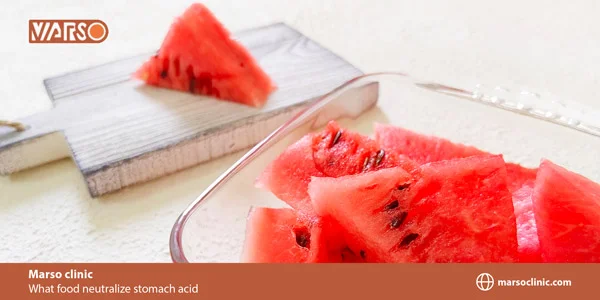Gastric or peptic acid reflux (GERD), also known as GERD, is very common these days among people of all ages. If you also have reflux or regular heartburn, read on. In this article, we will introduce you to the foods that relieve the discomfort of your reflux and we will find out which foods neutralize stomach acid
What you will read next:
Reflux or return of stomach acid to the esophagus:
It is an uncomfortable gastrointestinal complication that, in addition to burning the heart and causing a discharge from the back of the throat that forces the patient to clear his throat regularly, can cause chronic and prolonged coughing that will not respond to common treatments.
Gastro esophageal reflux disease (GERD) can unfortunately lead to some form of esophageal cancer by causing abnormal changes in the cells of the lower esophageal wall.
One of the causes of reflux is the weakness of the esophageal wall in the area that connects to the stomach and is called the lower esophageal sphincter or LES.
Your diet will not affect the amount of stomach acid and the type of gastric secretions. In the following, we will tell you what foods are suitable for relieving heartburn
What are the symptoms of GERD?
The following symptoms can be seen in gastric to esophageal reflux:
- Flatulence
- Chronic cough
- hiccups
- Feeling of discomfort in the throat, which is sometimes seen on examination as a sore throat
- Nausea
- Heartburn
- Chest pain that is different from heart pain
What foods neutralize stomach acid?
Before introducing foods that relieve GERD symptoms, it is necessary to emphasize that these foods will not be a cure for GERD but can only partially reduce your symptoms and relieve your discomfort. The best thing to do to treat gastric acid reflux is to consult a doctor.
Eating the following foods can reduce your symptoms:
- ginger:
You can use ginger powder or fresh ginger in your daily drinks, ginger will reduce your stomach upset and nausea. Also, the anti-inflammatory properties of ginger are significant in relieving stomach problems.
- Vegetables:
Vegetables can reduce gastric acid secretion due to their low sugar and fat content. Vegetables with green leaves, potatoes, cucumbers, broccoli and spinach are in this category.
- fruits:
-
Bananas, apples, pears, and cantaloupes are some of the fruits that do not stimulate gastric acid secretion, but other fruits can increase gastric acidity and stimulate reflux.
- Poultry and seafood:
If you have gastro esophageal reflux disease, it is better to replace red and fatty meats with chicken, fish and turkey (non-fried) because eating fatty meats will increase your stomach acid.
- Skim milk or very low-fat yogurt:
If you have reflux, these foods can neutralize your stomach acid, but if you use fat milk or yogurt, fat will increase the secretion of stomach acid and make your symptoms worse.
- Oatmeal:
Whole grains are low in fat and help neutralize stomach acid and relieve heartburn.
- Olive oil, sesame:
Avoid butter and animal oils and include healthy oils such as olive oil in your diet.
For people with GERD, the best protein is boiled egg white. This food can neutralize stomach acid.
Which foods should we not eat?
In contrast to the foods mentioned above, the following types will stimulate and increase the secretion of stomach acid:
- Fast foods and fried and high-fat foods
- Fruits that make the stomach more acidic:
Such as citrus fruits, pineapple, tomatoes and peppers
- Gastric acid-boosting foods such as garlic, onions and spices
- Caffeine:
Tea and coffee and caffeinated foods not only do not neutralize stomach acid but will also increase your symptoms
- Chocolates and cocoa:
These snacks, because they contain a substance called methylxanthine, greatly increase the symptoms of reflux. Methylxanthine can loosen the junction of the esophagus to the stomach, or LES, and increase the return of stomach acid to the esophagus.
- Mint:
All products containing mint, such as candies and mint gums, increase reflux.
Concluding remarks
Take another look at the list of foods that are good for neutralizing stomach acid. All of the above may not relieve your reflux symptoms.
You should pay attention to the following and have your own diet in a certain period, for example, two weeks or a month:
- What foods do I get more stomach acid from? (Discover your trigger)
- When do the symptoms of acid reflux increase?
- What foods neutralize stomach acid and reduce symptoms?
By being aware of the triggers and the timing of the onset of symptoms, you can greatly alleviate your discomfort.

